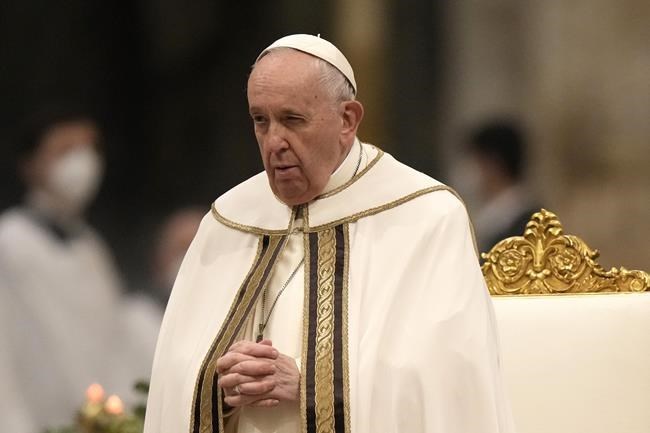
Pope Francis says vespers in the Roman Basilica of Saint Paul Outside the Walls on the solemnity of the conversion of St. Paul, in Rome on Tuesday, Jan. 25, 2022. An Indigenous delegation is to meet with the Pope at the Vatican in early spring to discuss reconciliation and healing after a visit was postponed because of the COVID-19 pandemic. THE CANADIAN PRESS/AP-Andrew Medichini
Republished February 01, 2022 - 1:55 PM
Original Publication Date February 01, 2022 - 6:11 AM
An Indigenous delegation is to meet with Pope Francis at the Vatican in early spring to discuss reconciliation and healing after a visit was postponed because of the COVID-19 pandemic.
A joint statement from the Canadian Conference of Catholic Bishops and national organizations representing First Nations, Inuit and Métis people says the delegation is to meet with the Pope in Rome the week of March 28. A final audience with him is to take place April 1.
"For those individuals who are chosen, they expressed a great desire to represent their people," said Bishop William McGrattan, vice-president of the bishops in Calgary.
"They saw this as something beyond their personal pilgrimage, or their personal going to meet the Holy Father. They were representing their communities. I think that’s the significance, the importance."
The health and safety of delegates remains the first priority, said the joint statement released Tuesday. The groups involved will monitor conditions and public health guidance leading up to the revised dates, travelling only if they feel it is safe to do so, it said.
The delegation was put on hold a week before the trip was to take place in December.
Indigenous groups and Canadian bishops said at the time that the decision was heartbreaking, but prudent, given how quickly the Omicron variant was spreading and the uncertainty that posed.
The risks were too great, they said, particularly for elders who would have travelled, and for those who could potentially bring back the virus to their remote communities, where COVID-19 can pose a higher risk due to crowded housing and a lack of health care.
The plan is to have 25 to 30 Indigenous people, including elders, residential school survivors and youth, meet with Pope Francis. First Nations, Métis and Inuit are to have separate meetings with him before a sitting with all three together.
The delegation's theme is how Indigenous Peoples and the Catholic Church can move forward together toward healing and reconciliation. It's expected Indigenous participants will also be able to share their expectations for a papal visit to Canada.
Cassidy Caron, president of the Métis National Council, said the goals of delegates and her group remain the same.
"I look forward to continuing to work with Métis Nation citizens to ensure our stories, especially those of Métis survivors, are shared with Pope Francis," Caron said in a statement.
Inuit Tapiriit Kanatami president Natan Obed said he is hopeful there will be no more schedule changes caused by the pandemic so that the groups will finally be able to sit down for an "action-oriented discussion with Pope Francis."
"This visit, and a direct personal encounter between Pope Francis and Inuit delegates, is a necessary part of our shared healing," Obed said in a statement.
The Canadian Conference of Catholic Bishops is to cover travel costs.
McGrattan said the groups wanted an in-person meeting rather than a virtual one because it was important that Pope Francis hear about residential schools directly from survivors and their descendants.
"This was an opportunity not only for him to hear what they have been experiencing but also, I think, to help prepare him for his eventual visit," McGrattan said.
Last year, the Vatican announced that the Pope was willing to make that pilgrimage. Indigenous leaders have said it must come with an apology.
Calls for the Pope to apologize for the church's role in residential schools have intensified since the discovery last year of unmarked graves at former school sites.
Over a century, an estimated 150,000 Indigenous children were forced to attend residential schools. More than 60 per cent of the schools were run by the Catholic Church.
The Indian Residential Schools Resolution Health Support Program has a hotline to help residential school survivors and their relatives suffering trauma invoked by the recall of past abuse. The number is 1-866-925-4419.
This report by The Canadian Press was first published Feb. 1, 2022.
News from © The Canadian Press, 2022